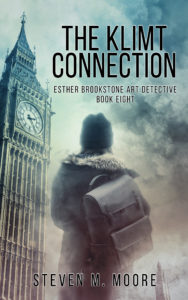The future of British royalty…
[Note from Steve: The reader may consider this part two of the article “Brits don’t like me…”.]
While the British royals are far from being main characters in the “Esther Brookstone Art Detective” series, the mere fact that the series is partially set in the UK implies that mentioning them from time to time is hard to avoid. And while I’ll repeat here that I wish old Queen Elizabeth well on her Platinum Jubilee (she’s now the longest reigning British monarch), but even the most ardent fan of British royalty must wonder what the future will bring because she’s at a frail age. Prince Charlie won’t be nearly as long on the throne—he’s turning seventy-four, after all!
To put things in perspective, though, that royal family is just as troubled and dysfunctional as any other family. And the Royal Mum hasn’t done too well raising her kids either. (Charlie is an ex-philanderer and Andrew an ex-pervert. One never hears much about Anne or Edward.) No one knows how grandson Willie will turn out either when he ascends the throne.
Europe in general and the UK in particular, together with the Commonwealth countries, just can’t shake off their traditional remnants of royalty. Most have managed to create stable democracies despite their royals, though. In fact, their parliamentary systems are inherently more stable than presidential ones for the simple reason that the PM is chosen by the party in power in the main legislative body. Few parliamentary systems have made the mistakes the US’s founding fathers made in creating the US Senate and Electoral College. The UK’s House of Lords is basically just a powerless debating society, a gentlemen’s club for useless British toffs.
So, why do European countries, nearly all with a parliamentary system, tolerate their foppish royals? Because they’re addicted to the pomp and circumstance (strike up Elgar’s famous pieces, maestro), something a PM and Parliament can’t provide. I suppose the only bad thing about all that P and C is that taxpayers’ money is spent on it and on providing those foppish royals an easy, pampered life!
Let’s face it, Americans: Most European countries have a lot more history than many other nations, including ours, so their traditional P and Q has a long history as well. The Brits are more addicted to it than most, so I suspect they will keep plodding along, feeding their addiction and tolerating the royal parasites.
 There’s a group in the UK, though, promoting the idea that Queen Elizabeth should be that country’s last monarch. (Maybe Esther Brookstone—see below—is a member of that group? She votes Labour, you know.) I don’t believe that will occur there or elsewhere in Europe—the addiction is just too strong. Making the tradition of royal characters in our fiction will continue as well, so authors should include them when they indeed be useful characters.
There’s a group in the UK, though, promoting the idea that Queen Elizabeth should be that country’s last monarch. (Maybe Esther Brookstone—see below—is a member of that group? She votes Labour, you know.) I don’t believe that will occur there or elsewhere in Europe—the addiction is just too strong. Making the tradition of royal characters in our fiction will continue as well, so authors should include them when they indeed be useful characters.
 Tom Clancy included Prince Charlie in Patriot Games; I mention him in several “Brookstone” novels as well. I put other European royals in some novels too, most obviously in Aristocrats and Assassins from the “Chen and Castilblanco” series (Esther’s Bastiann has a cameo in that novel, by the way). In general, royals are secondary characters in my prose, but they add some realism to the European novels. And, to paraphrase Clancy, fiction to be successful has to seem real, so we probably should keep them around in our fiction when appropriate.
Tom Clancy included Prince Charlie in Patriot Games; I mention him in several “Brookstone” novels as well. I put other European royals in some novels too, most obviously in Aristocrats and Assassins from the “Chen and Castilblanco” series (Esther’s Bastiann has a cameo in that novel, by the way). In general, royals are secondary characters in my prose, but they add some realism to the European novels. And, to paraphrase Clancy, fiction to be successful has to seem real, so we probably should keep them around in our fiction when appropriate.
***
 Comments are always welcome. (But please follow the rules on my “Join the Conversation” web page. If you don’t, your comment goes to the spam folder!)
Comments are always welcome. (But please follow the rules on my “Join the Conversation” web page. If you don’t, your comment goes to the spam folder!)
The “Esther Brookstone Art Detective” series. While Esther and hubby Bastiann have taken a well-deserved retirement, readers can still read about their adventures in the nine novels of the series. Many take place in the UK, of course, because it’s Esther’s home patch, but she also travels to Ireland, Scotland, and even to Peru, Norway, and Turkey as the series progresses. You don’t have to work as hard as the old girl, though. You can enjoy all the mystery, thrills, and suspense from your favorite reading chair, maybe while sipping tea and enjoying some scones? Or with a frosty gin and tonic this summer? Good times await you in any case. Jump into the series anywhere—each novel can stand alone—or start with the first novel, Rembrandt’s Angel, where Esther is obsessed with recovering a painting stolen by the Nazis in World War II.
Around the world and to the stars! In libris libertas!
